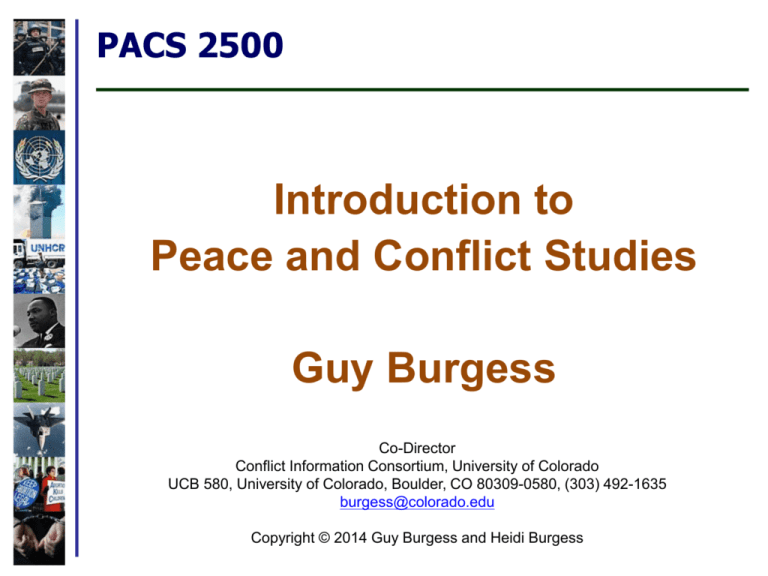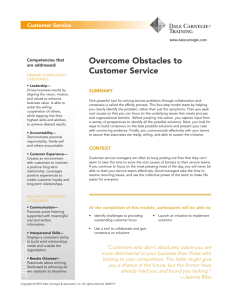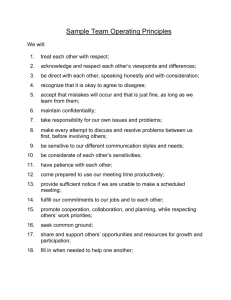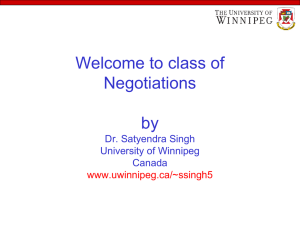PPT Slides -- February 26 - Peace and Conflict Studies
advertisement

PACS 2500 Introduction to Peace and Conflict Studies Guy Burgess Co-Director Conflict Information Consortium, University of Colorado UCB 580, University of Colorado, Boulder, CO 80309-0580, (303) 492-1635 burgess@colorado.edu Copyright © 2014 Guy Burgess and Heidi Burgess Lowest Number Grade for Each Letter Grade 119 96 90 84 81 79 75 71 67 62 56 54 A+ A/A+ A A/AAA/B B+ B/B+ B B/BBC+/B- 52 51 47 45 42 40 36 30 27 16 9 C C+ C/C+ C C/CCC/D D/D+ D/DF F-- Questions about how your test was graded. After class Thursday or by appointment. Re-Test / Extra Credit Option Test #1 Only http://peacestudies.colorado.edu/test-1-re-test-extra-credit-assignment Constructive/Legitimate vs. Destructive/Illegitimate Power Contests Legitimate Power Options Illegitimate Power Options Administrative Appeals Bribes (Legal/Illegal) Rights-Based Litigation Loophole Litigation “Hot Button” Propaganda” Principled Campaigns Democratic Elections Secret Police Nonviolent Action Terrorism Conquest/Invasion Military Defense Invisible Hand Invisible Fist (Monopoly) BATNA Best Alternative to a Negotiated Agreement On what basis do you decide whether or not to accept a negotiated agreement? BATNA Best Alternative to a Negotiated Agreement Conclusion of a Negotiation Process Administrative appeal Legal challenge Political lobbying Are there any power contest alternatives that are likely to give me a better deal? Electoral campaigns Public persuasion Economic action Civil disobedience Accept Agreement Military action Etc, BATNA Limit / Ripeness Conclusion of a Negotiation Process Administrative appeal Conclusion of a Negotiation Process Legal challenge Are there any power contest alternatives that are likely to give me a better deal? Political lobbying Electoral campaigns Public persuasion Are there any power contest alternatives that are likely to give me a better deal? Economic action Accept Agreement Civil disobedience Military action Etc, Accept Agreement BATNA Limit / Ripeness Conclusion of a Negotiation Process Conclusion of a Negotiation Process Are there any power contest alternatives that are likely to give me a better deal? Are there any power contest alternatives that are likely to give me a better deal? WIN Ballot Initiative WIN Power Contest Shortcut Accept Agreement Bitter End Path Accept Agreement BATNA Limit / Ripeness Conclusion of a Negotiation Process Conclusion of a Negotiation Process Are there any power contest alternatives that are likely to give me a better deal? Are there any power contest alternatives that are likely to give me a better deal? WIN Ballot Initiative LOSE Power Contest Shortcut Accept Agreement Bitter End Path Accept Agreement Consensus Building Institute Consensus Building I Assumption: the parties really want to resolve the dispute Usually business-as-usual is not acceptable Examples • • • • • • Metropolitan Denver water supply Social Security Denver-area transit Municipal budget downsizing Security and anti-terrorism Boulder Open Space management Consensus Building II Step #1: Conflict assessment / development of a consensus building plan Need lead individual / organization to do the work Identify stakeholders • Active and latent stakeholders • Especially those with veto power • Constituency groups and potential representatives Determine stakeholder interests (with visits / documents) • Formal (often legal) responsibilities • Formal (often legal) constraints • Powers (legal, political, economic, public opinion) Consensus Building III Explain consensus building opportunities and options Discuss their willingness to participate “in good faith” Concerns that must be overcome Opportunities that they would like to see developed Identify potential funding sources Prepare a consensus building proposal Must work within existing responsibility and power relationships Consensus Building IV Step #2: Sell the proposal Obtain commitments to participate from key stakeholders Obtain skilled facilitation/mediation services • May be different from person doing assessment Obtain adequate funding Consensus Building V Step #3: Implement the consensus building process Convene stakeholder/participants Establish ground rules Agree on meeting schedule Establish routine negotiators/constituent loop Build interpersonal relationships among negotiators Identify problems to be addressed • Field trips, narratives Consensus Building VI Step #3 (continued) Identify interests to be protected/advanced Identify options for mutual gain • Or minimal loss (in negative-sum) conflicts Identify action forcing mechanisms Step #4: Implement the agreement Sequencing / enforcement Periodic reassessments Fire Next Time An Intimate Window Into the Red/Blue Divide Flathead Community "Re-Boot" Forum Group #1: Not in Our Town Group #2: Environmentalists Group #3: Logging Industry Group #4: ORV Recreationists Group #5: Community Leaders Group #6: Assertive Activists Mirrors Hands Against Hate Assertive Activists • Try to understand their frustrations – Lost jobs – Lost recreation – Perceived government favoritism – race – Misinformation – No recourse within government – Fear • Still, illegitimate tactics can discredit the movement Extra Slides Other Examples Flathead Community "Re-Boot" Forum Fire Next Time Community Common Ground Meeting • Two discussion group scores • Group #1 / Interest • Group Caucus Group #2 / Community Roundtables / Plenary Common Ground Meeting What points of agreement exist? What points of disagreement exist? Fact-based disagreements Value-based disagreements What initiatives can you imagine that would achieve broad (but not necessarily universal support)? In cases where we feel we must “agree to disagree” how can we handle those disagreements most constructively? Ground Rules Treat others the way you would like to be treated Accept that you are talking about important issues that everyone really cares about Respect others and expect to be respected Listen and expect to be listened to Agree where you can, but disagree where you must Acknowledge that participants will still be aggressive advocates following the meeting Goal: • Identify areas in which we can work together • Focus our disagreements as constructively as possible on the core issues Pre-Meeting Group Caucuses Identify Interests you want to defend / advance – things you really care about Persuasive arguments explaining why the things that you care about are in the interest of the whole community Factual arguments supporting your position Proposed “quid pro quo” exchanges / compromises Strategies for dealing with irreconcilable differences (constructive, non-violent confrontations) Group Roles Really try to imagine yourself in their position Common Ground Meeting What points of agreement exist? What points of disagreement exist? Fact-based disagreements Value-based disagreements What possible compromises can you imagine for simultaneously advancing the interests of all parties? In cases where we feel we must “agree to disagree” how can we handle those disagreements most constructively? Forum Goals Not to suppress conflict Help everyone advance their core interests Limit destructive conflict dynamics that are making it hard to advance those interests Group Assignments? • Groups will be randomly assigned next Tuesday unless you volunteer for a group or groups by 9am Monday using the urgent contact form. • In general, things work better if everybody really believes in their group – so volunteer for a group that you can identify with. • Also, I need volunteers for the “Assertive Activists” group – the most non-politically correct group. For this to work, I need people to really try to understand their perspectives. 3rd Party Intervention / Rescue 3rd Party / Intermediary Processes Adjudication Special Case: Mock Trials Arbitration Special Case: Final Offer Arbitration Med-Arb (Mediation/Arbitration) Mediation Special Case: Transformative Mediation Facilitation Convening Hybrid Processes Neutrality? Other Ideas Self-Interest vs. Social Interests Higman’s “WHY?” questions NIMBY’s NOPE’s BANANA’s Within Coalition vs. Between Coalition Fairness Principles








